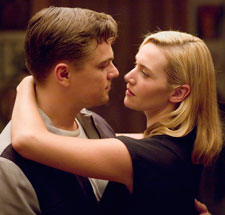The prospect of Kate Winslet and Leonardo DiCaprio staring in another film together was always going to invite comparisons with Titanic. I'd like to resist the cliché, but the more I think about it, the more I wonder whether Sam Mendes' new production might have been accurately subtitled Titanic II - the end of the affair. Or, in short, what might have happened if the lovers had lived on and been subsumed into suburbia. Revolutionary Road presents itself as a stark warning of what happens when people allow conformity to sink their dreams.
 Revolutionary Road presents as something of a lament for the stunted lives of those who raised families in the 1950s and '60s. Frank Wheeler (DiCaprio) enters the film a brash young man, newly returned from the war, who has little more ambition than that he be allowed to 'feel things'. However the story swiftly moves to the point where he his working for the same business machine firm his father once slaved in. He recounts ironically how he used to suffer through long lunches on 'life' with his father:
Revolutionary Road presents as something of a lament for the stunted lives of those who raised families in the 1950s and '60s. Frank Wheeler (DiCaprio) enters the film a brash young man, newly returned from the war, who has little more ambition than that he be allowed to 'feel things'. However the story swiftly moves to the point where he his working for the same business machine firm his father once slaved in. He recounts ironically how he used to suffer through long lunches on 'life' with his father:
"I used to sit there and think, 'I hope to Christ I don’t end up like you. Now here I sit, a 30-year-old Knox man."
A similar bitterness rooted in frustration is eating up April Wheeler (Winslet), who once considered her husband, ". the most interesting man I know". Together, they rage and snipe at each other in ways only a married couple can, targeting the weaknesses they have come to despise in themselves and each other. Apart, they despair at the limitations imposed by the 15th floor work cubicle and the white-picketed suburban prison, and console themselves with petty, self-punishing affairs. The chief grief they share is a lost identity. Pointing to their neighbours, April pleads with Frank,
"We have bought into the same ridiculous conclusion: that you are meant to settle down .. It is what you are that is being stifled. That is what is being choked in this environment."
Those who have enjoyed The Hours and Far From Heaven will find that Revolutionary Road runs along similar ground. If there is a difference, it seems that the film is actually pitched to appeal to the children of Frank and April's generation. It painted 'builders' with the same uniform, suburban brush and imbued them with an angst that seems more common to aging 'boomers' still looking for reasons to continue what, generationally speaking, has been a remarkably self-focused journey. Sam Mendes provides plenty of mileage with Revolutionary Road's conclusion that the denial of individual expression is the first step to self-destruction. The film's ultimate verdict on the perils of modern conformity comes in the form of an observation made by a 'wise' insane asylum inmate played by Michael Shannon:
"Plenty of people are on to the emptiness but it takes real courage to [admit] the hopelessness."
Of course there is little mention of the numerous everyday sacrifices that are made in suburbia for the sake of others. April offers to work to allow Frank to discover himself if they agree to move to Paris, but she is ultimately unable to deliver any sacrifice that requires a life of apparent social suffocation. In the end, we are told that those who insist on playing it safe not only kill their own dreams, they destroy anyone who has anything to do with them.
It seems that there is no place in Revolutionary Road for a life lived for the sake of others. I couldn't help wondering what its key characters might have made of Jesus' decision to give over everything he possessed as the Lord of All, to save sinful creatures - so much 'lost potential' I think. The Christian faith is fundamentally at odds with a storyline that makes self-discovery the ultimate good and the eventual saviour. Rather, we find that in losing our claims to self-determination, we discover ourselves as children of God. Giving up yourself in order to find yourself? Now that would be a revolutionary road.
























